
Find Help
More Items From Ergsy search
-

What is a blood transfusion?
Relevance: 100%
-

Blood Product Transfusions
Relevance: 100%
-

Blood Transfusion
Relevance: 97%
-

Are there risks associated with blood transfusions?
Relevance: 95%
-

Is there an age limit for receiving blood transfusions?
Relevance: 92%
-

Is HTLV a risk in blood transfusions?
Relevance: 92%
-

Is Hepatitis B a risk in blood transfusions?
Relevance: 91%
-

Why might someone need a blood transfusion?
Relevance: 89%
-

How long does a blood transfusion take?
Relevance: 88%
-

What diseases can be spread by blood transfusions?
Relevance: 88%
-

What types of blood products can be transfused?
Relevance: 88%
-

How do healthcare providers match blood for transfusions?
Relevance: 87%
-

Is Chagas disease a concern with blood transfusions?
Relevance: 87%
-
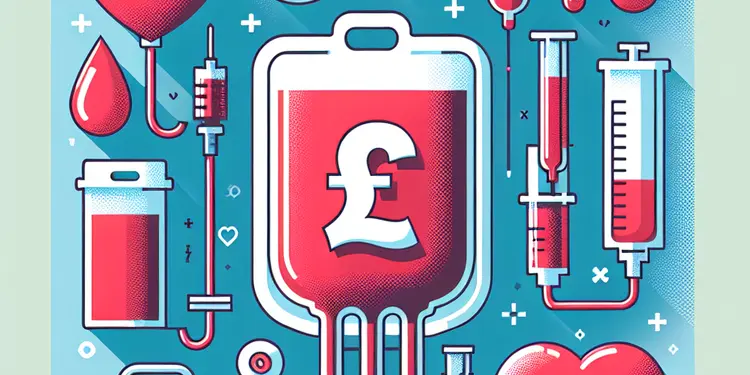
Can HIV be transmitted through blood transfusions?
Relevance: 87%
-

What are some common reasons blood transfusions are needed?
Relevance: 86%
-

Can someone have a reaction to a mismatched blood transfusion?
Relevance: 86%
-

Can syphilis be transmitted via blood transfusion?
Relevance: 86%
-

Is Zika virus screened for in blood transfusions?
Relevance: 85%
-
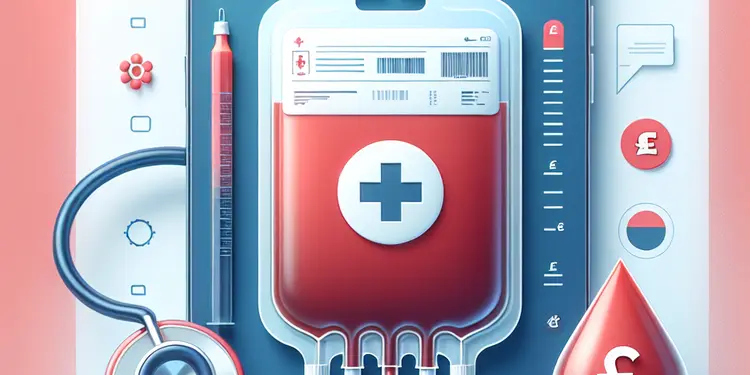
Can bacterial infections be transmitted through blood transfusion?
Relevance: 84%
-
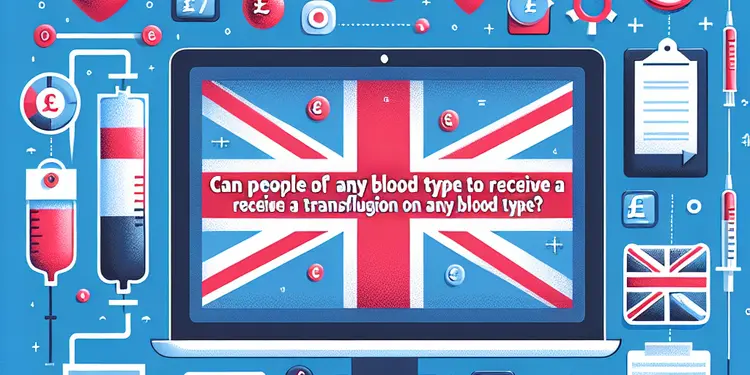
Can people of any blood type receive a transfusion of any blood type?
Relevance: 84%
-

Are there any parasites that can be transmitted through blood transfusions?
Relevance: 84%
-
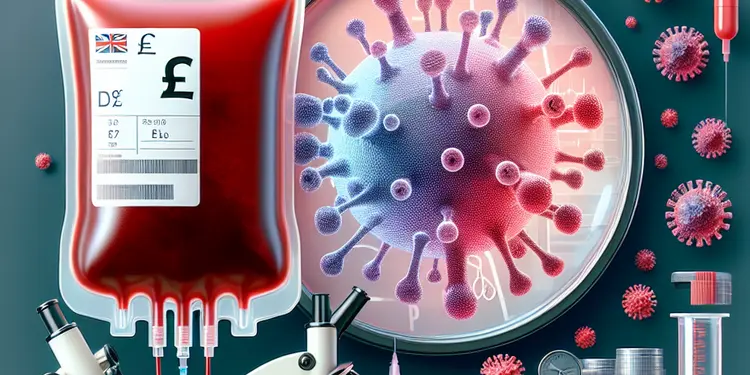
What is the most common disease transmitted by blood transfusion?
Relevance: 84%
-

Is malaria still a concern for blood transfusion safety?
Relevance: 84%
-

Can COVID-19 be transmitted through blood transfusions?
Relevance: 84%
-
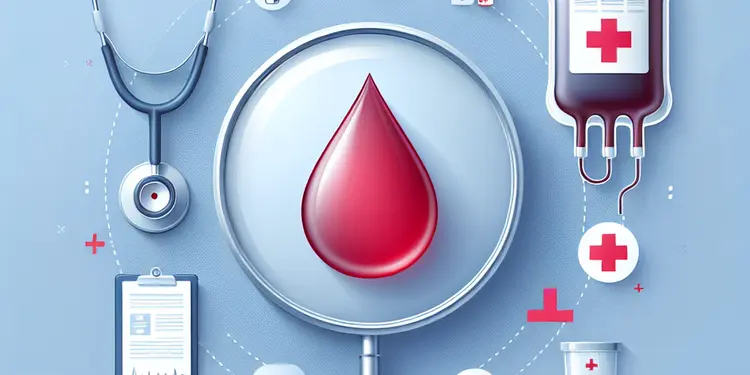
How do doctors determine how much blood is needed for a transfusion?
Relevance: 83%
-

Can Dengue fever be transmitted through blood transfusions?
Relevance: 83%
-

Can certain medical conditions prevent receiving blood transfusions?
Relevance: 83%
-

Can you get any prion diseases from blood transfusion?
Relevance: 77%
-

What measures are taken to prevent disease transmission in blood transfusions?
Relevance: 75%
-

Is blood used for transfusions safe?
Relevance: 71%
-

What is plasma, and why might it be transfused?
Relevance: 69%
-

Can cytomegalovirus (CMV) be spread through transfusions?
Relevance: 67%
-

Are there global differences in screening for blood transfusions?
Relevance: 66%
-

What should a patient expect after a blood transfusion?
Relevance: 61%
-

How is blood screened to prevent disease transmission?
Relevance: 60%
-

What kind of follow-up care is needed after a blood transfusion?
Relevance: 59%
-

What other viruses are tested for in blood donations?
Relevance: 53%
-

Are new emerging pathogens a risk for blood safety?
Relevance: 53%
-

How is a blood transfusion performed?
Relevance: 48%
-

Can you donate blood specifically for a friend or family member?
Relevance: 42%
Duration of a Blood Transfusion: An Overview
Blood transfusions are a common medical procedure used to replace lost components of the blood. They are crucial in treating patients in a variety of medical situations, from surgery to chronic illnesses. Understanding the duration of a blood transfusion can help patients and their families better prepare for the procedure.
Factors Influencing Transfusion Time
The duration of a blood transfusion largely depends on several factors, such as the type of transfusion being administered, the patient's specific medical conditions, and the rate at which the blood can be infused safely. Generally, a transfusion can take anywhere from 1 to 4 hours. However, the exact time may vary based on individual circumstances.
Typical Duration for Different Components
Different components of blood transfusions have varying recommended durations. For example, a red blood cell transfusion typically takes about 2 to 4 hours. Platelet transfusions, on the other hand, are usually administered over a shorter period, often ranging from 30 minutes to 1 hour. Plasma transfusions might also take around 30 minutes to 1 hour to complete.
Importance of Monitoring During Transfusion
During a blood transfusion, it is essential that patients are closely monitored by healthcare professionals to ensure their safety. Vital signs, such as blood pressure, heart rate, and temperature, are checked regularly to detect any adverse reactions promptly. Monitoring can also influence the duration of the transfusion, as adjustments might be needed based on the patient's response.
Pre-Transfusion Preparation and Post-Transfusion Care
Before the transfusion begins, healthcare providers perform a blood type and crossmatch test to ensure compatibility, which adds additional time to the overall process. After the transfusion, patients are often monitored for a short period to observe any potential delayed reactions. This post-transfusion period is a critical part of the process and contributes to the overall duration patients spend in a healthcare setting.
Conclusion
Understanding the time commitments involved in a blood transfusion can help patients plan their day accordingly. While the transfusion itself may take anywhere from 1 to 4 hours, it is important to allow additional time for pre-transfusion preparation and post-transfusion monitoring. Always consult with healthcare providers for personalized information tailored to your specific medical needs. This will ensure a safe and effective transfusion experience.
How Long Does a Blood Transfusion Take?
A blood transfusion is when you get new blood in your body to help you get better. Doctors do this if you're sick or need surgery. Knowing how long it takes can help you and your family get ready.
What Can Change How Long It Takes?
How long a blood transfusion takes can be different for each person. It depends on what kind of blood you need, your health, and how fast the blood can be given to you safely. Usually, it takes about 1 to 4 hours. But it can be different for everyone.
How Long for Different Blood Parts?
Different parts of the blood take different times. Red blood cells usually take 2 to 4 hours. Platelets, which help stop bleeding, can take 30 minutes to 1 hour. Plasma might take 30 minutes to 1 hour too.
Why Watching Closely is Important
When you have a blood transfusion, doctors and nurses will keep a close eye on you. They check things like your blood pressure and heart rate to make sure everything is okay. If something changes, they might change how fast you get the blood.
Getting Ready and After the Transfusion
Before you start, doctors check your blood to make sure it matches. This takes extra time. After the transfusion, you might need to stay a little longer so they can watch you to make sure you feel okay. This is very important and adds time too.
Final Thoughts
Knowing how long a blood transfusion takes can help you plan your day. While it usually takes 1 to 4 hours, remember that the preparation and watching afterwards take extra time too. Always talk to your doctor for advice just for you. This keeps your transfusion safe and helps you get better.
Frequently Asked Questions
How long does a blood transfusion usually take?
A blood transfusion typically takes 1 to 4 hours to complete.
What factors influence the duration of a blood transfusion?
Factors include the volume of blood, the patient's condition, and potential reactions.
Is there a minimum time required for a blood transfusion?
A blood transfusion usually takes at least an hour to ensure safety.
Can a blood transfusion take longer than usual?
Yes, depending on the patient's condition and the need to administer it slowly.
How quickly can a blood transfusion be administered in an emergency?
In emergencies, transfusions can be started rapidly, but safety is still a priority.
Are there protocols to speed up a blood transfusion?
Protocols prioritize patient safety, so speed is balanced with care.
Does the type of blood product affect the transfusion time?
Yes, different products like platelets or plasma can vary in transfusion time.
How does the recipient's condition affect transfusion time?
Certain conditions may require a slower administration for safety.
Why might a blood transfusion take only an hour?
A single unit given without complications can take about an hour.
Why do some blood transfusions take up to 4 hours?
Complex needs or precautions may extend the time to 4 hours.
Is patient monitoring necessary during a blood transfusion?
Yes, patients are carefully monitored for any adverse reactions.
What role does the medical team play during a transfusion?
They monitor vitals, check for reactions, and ensure correct rates.
Can a blood transfusion be stopped once it starts?
Yes, if reactions occur, the transfusion can be paused or stopped.
What happens if a reaction occurs during transfusion?
The transfusion may be paused or stopped, and medical intervention is provided.
Is it common for a blood transfusion time to change mid-procedure?
Adjustments may be made based on patient response and monitoring.
How many units of blood can a person receive at one time?
It depends on the patient's needs and medical condition.
Does receiving more than one unit affect transfusion time?
Yes, each additional unit extends the duration proportionally.
Is rest recommended after a blood transfusion?
Patients are usually advised to rest for a while post-transfusion.
Does hospital policy influence transfusion duration?
Yes, hospitals have policies to ensure safe transfusion practices.
Are children and adults given transfusions at different rates?
Yes, transfusion rates can differ based on age and size, especially in children.
How long does it take to get blood?
A blood transfusion usually takes 1 to 4 hours to finish.
If you need help understanding words, you can ask someone to explain or use picture cards. Listening to the text or using colored overlays might also help.
What things affect how long a blood transfusion takes?
Things that are important are:
- How much blood there is
- How the person is feeling
- How the person might react
How long does a blood transfusion take?
A blood transfusion is when you get blood from someone else. It takes some time. You can't rush it. Doctors need to do it safely.
Ask your doctor how long it will take. They will make sure you are safe.
You can use pictures or listen to someone explain to understand better.
A blood transfusion usually takes at least one hour. This is to make sure it is safe.
Can a blood transfusion take a long time?
Yes, sometimes a blood transfusion can take longer than usual. If this happens, the doctor or nurse will let you know why.
It is important to stay calm and ask questions if you are unsure. You can use a watch or a timer to see how much time has passed. Having someone like a friend or family member with you can be helpful too.
Yes, sometimes a doctor needs to give medicine slowly. It depends on how the patient is feeling.
How fast can you get a blood transfusion in an emergency?
When someone needs blood quickly, doctors can give it to them fast.
If it's an emergency, doctors and nurses work very quickly to help. They act fast to give the blood to the person who needs it.
Reading help:
- Ask someone to read with you.
- Use a dictionary for words you don't know.
- Listen to the text using speech-to-text apps.
During emergencies, blood transfusions need to start quickly, but it is important to stay safe.
Can you make a blood transfusion faster?
Sometimes, people need to get blood quickly to help them feel better. Doctors have special ways to do this safely. Here’s how they might help:
- Use a special machine that pumps blood faster.
- Warm the blood before giving it. This helps it flow quickly.
- Check the person's body carefully to make sure they stay safe.
If you have questions, ask your doctor. They will explain and help you understand.
Using pictures or a friend to help read can also be useful.
Doctors and nurses are careful and work safely with patients. They try to be quick but make sure everyone is safe.
Does the kind of blood affect how long a transfusion takes?
Yes, the time it takes to give different blood products, like platelets or plasma, can be different.
How does the person's health change how long a blood transfusion takes?
Sometimes, giving medicine slowly is safer.
Why does a blood transfusion sometimes take only one hour?
A blood transfusion can be fast, taking just one hour. Here are some reasons why:
- The patient might not need much blood.
- The patient might be healthy and can handle the blood quickly.
- The doctor or nurse might use special equipment to help give blood faster.
If you find reading hard, you might try these ideas:
- Ask someone to read with you.
- Use a tool to read the text out loud.
- Look at any pictures or diagrams that can help understand the text.
When there are no problems, it can take about one hour to give a single unit.
Why does a blood transfusion take a long time?
Sometimes, giving blood can take up to 4 hours. This is to keep you safe. It is important to go slow so your body gets used to the new blood.
If you are worried, you can:
- Ask questions to understand more.
- Bring a book or something to do.
- Talk to the nurse if you feel unwell.
Sometimes, things can take longer if there are special needs or extra care needed. It might take up to 4 hours.
Do doctors need to watch patients during a blood transfusion?
Yes, it is important for doctors and nurses to watch patients closely during a blood transfusion. This helps keep the patient safe and healthy.
Here is why watching is important:
- To make sure the blood transfusion is going well.
- To check if the patient feels okay.
- To quickly help if any problems happen.
Some tools that help are:
- Heart and breathing monitors to check the patient's health.
- An emergency kit to help if any problems happen.
Patients can ask questions if they are worried or need more information.
Yes, doctors watch patients closely to see if they feel sick.
What does the medical team do during a transfusion?
The medical team helps to make sure the blood transfusion is safe. They watch you closely and check if you feel okay. They also look for any problems or changes. The doctors and nurses are there to help you.
If you have questions, you can ask them at any time. They are there to support you. You can also use a picture book with simple words to understand better.
They watch your body signs, look for changes, and make sure things happen at the right speed.
Can you stop a blood transfusion once it begins?
Yes, you can stop a blood transfusion if you need to. If you feel sick or have any problems during the transfusion, tell a doctor or nurse right away. They can stop it and help you feel better.
Here are some things that might help:
- Have a friend or family member with you to support you.
- Ask questions if you don’t understand something.
- Tell the nurse or doctor if you feel funny or different during the transfusion.
Yes, if there is a problem, the doctor or nurse can stop the blood transfusion or take a break.
What happens if someone has a reaction during a blood transfusion?
The blood transfusion may be paused or stopped. A doctor or nurse will help you if anything goes wrong.
Can the time for a blood transfusion change while it's happening?
Sometimes, when someone gets a blood transfusion, the time it takes might change. If this happens, the doctor or nurse will tell you why. They might need to change the speed to keep the person safe.
Remember, if you have questions, you should ask the doctor or nurse. They can help you understand what's going on.
Some tools can help you understand more:
- Pictures: Drawings can show how things work.
- Simple words: Use words you know to explain things.
- Ask someone to help you read: A friend or family member can read with you.
Doctors may change treatment if the patient needs it. They will check to see how the patient is doing.
How much blood can a person get at once?
It depends on what the patient needs and their health.
Does getting more than one unit change how long a transfusion takes?
Some people get more than one bag of blood during a transfusion. We want to know if this makes the process take a longer or shorter time.
Supportive Tools and Techniques:
- Ask someone to explain this to you in different words.
- Break down the sentence into smaller parts.
- Use pictures or videos to help you understand transfusions.
Yes, each time you add another part, it lasts longer by the same amount.
Should you rest after a blood transfusion?
Yes, it is good to rest after a blood transfusion. Resting helps your body get better. If you feel tired, it's okay to sleep. You can also ask someone to help you if you need it.
After a blood transfusion, doctors say it’s best to rest for a bit.
- Supportive tool: Have a comfy chair or bed ready.
- Technique: Take deep breaths and relax your body.
Do hospital rules change how long transfusions take?
Yes, hospitals have rules to keep blood transfusions safe.
Do kids and grown-ups get blood transfusions at different times?
Yes, the amount of blood needed can change with different ages and sizes, especially for kids.
Useful Links
This website offers general information and is not a substitute for professional advice.
Always seek guidance from qualified professionals.
If you have any medical concerns or need urgent help, contact a healthcare professional or emergency services immediately.
Some of this content was generated with AI assistance. We’ve done our best to keep it accurate, helpful, and human-friendly.
- Ergsy carfully checks the information in the videos we provide here.
- Videos shown by Youtube after a video has completed, have NOT been reviewed by ERGSY.
- To view, click the arrow in centre of video.
- Most of the videos you find here will have subtitles and/or closed captions available.
- You may need to turn these on, and choose your preferred language.
- Go to the video you'd like to watch.
- If closed captions (CC) are available, settings will be visible on the bottom right of the video player.
- To turn on Captions, click settings .
- To turn off Captions, click settings again.
More Items From Ergsy search
-

What is a blood transfusion?
Relevance: 100%
-

Blood Product Transfusions
Relevance: 100%
-

Blood Transfusion
Relevance: 97%
-

Are there risks associated with blood transfusions?
Relevance: 95%
-

Is there an age limit for receiving blood transfusions?
Relevance: 92%
-

Is HTLV a risk in blood transfusions?
Relevance: 92%
-

Is Hepatitis B a risk in blood transfusions?
Relevance: 91%
-

Why might someone need a blood transfusion?
Relevance: 89%
-

How long does a blood transfusion take?
Relevance: 88%
-

What diseases can be spread by blood transfusions?
Relevance: 88%
-

What types of blood products can be transfused?
Relevance: 88%
-

How do healthcare providers match blood for transfusions?
Relevance: 87%
-

Is Chagas disease a concern with blood transfusions?
Relevance: 87%
-

Can HIV be transmitted through blood transfusions?
Relevance: 87%
-

What are some common reasons blood transfusions are needed?
Relevance: 86%
-

Can someone have a reaction to a mismatched blood transfusion?
Relevance: 86%
-

Can syphilis be transmitted via blood transfusion?
Relevance: 86%
-

Is Zika virus screened for in blood transfusions?
Relevance: 85%
-

Can bacterial infections be transmitted through blood transfusion?
Relevance: 84%
-

Can people of any blood type receive a transfusion of any blood type?
Relevance: 84%
-

Are there any parasites that can be transmitted through blood transfusions?
Relevance: 84%
-

What is the most common disease transmitted by blood transfusion?
Relevance: 84%
-

Is malaria still a concern for blood transfusion safety?
Relevance: 84%
-

Can COVID-19 be transmitted through blood transfusions?
Relevance: 84%
-

How do doctors determine how much blood is needed for a transfusion?
Relevance: 83%
-

Can Dengue fever be transmitted through blood transfusions?
Relevance: 83%
-

Can certain medical conditions prevent receiving blood transfusions?
Relevance: 83%
-

Can you get any prion diseases from blood transfusion?
Relevance: 77%
-

What measures are taken to prevent disease transmission in blood transfusions?
Relevance: 75%
-

Is blood used for transfusions safe?
Relevance: 71%
-

What is plasma, and why might it be transfused?
Relevance: 69%
-

Can cytomegalovirus (CMV) be spread through transfusions?
Relevance: 67%
-

Are there global differences in screening for blood transfusions?
Relevance: 66%
-

What should a patient expect after a blood transfusion?
Relevance: 61%
-

How is blood screened to prevent disease transmission?
Relevance: 60%
-

What kind of follow-up care is needed after a blood transfusion?
Relevance: 59%
-

What other viruses are tested for in blood donations?
Relevance: 53%
-

Are new emerging pathogens a risk for blood safety?
Relevance: 53%
-

How is a blood transfusion performed?
Relevance: 48%
-

Can you donate blood specifically for a friend or family member?
Relevance: 42%


